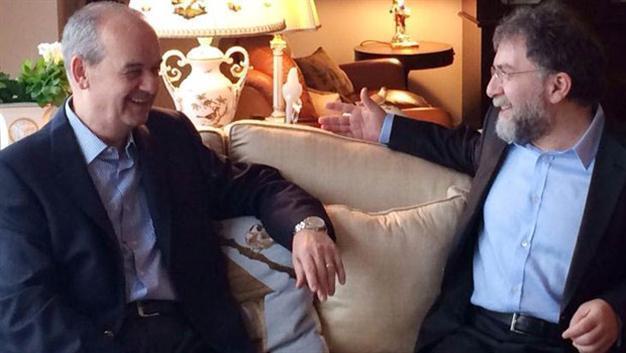Were foreign hands behind the trials against the Turkish army?
ISTANBUL

Hürriyet columnist Ahmet Hakan visited fomer army chief İlker Başbuğ at his house. HÜRRİYET photo
I met İlker Başbuğ in his house. He did not look as if he had left jail only three days ago, but rather as if he had just resigned as Chief of General Staff. He was in peace and had an orderly and dignified manner.
Başbuğ had delivered a speech in Balıkesir when he was Chief of General Staff. It was quite a strong speech. I joked about it, writing “Listening to the Chief of General Staff, I find myself hanging a flag on my balcony.”
He turned to me and said, “Did you find my speech when I left the prison strong? Did you catch yourself hanging a flag on the balcony?” I laughed and said, “No, no, I was not sacred this time.”
He was not in a vengeful mood. Obviously he wants those responsible to be accounted for. But he has a clear cut condition, “The trial need to be fair, the opposite isn’t acceptable.”
After a long conversation with Başbuğ, I asked “What will you do from now on?” He said, “I will leave Istanbul and rest a little.”
Başbuğ: The first aim is to finish this oppressionLet me write İlker Başbuğ’s manifesto for “first aims.”
This is what he says: “They ask me, ‘Had Feb. 7 [2012, when the police wanted to question the head of the National Intelligence Organization, MİT] not happened, would we have had this outcome? Had Dec. 17 [2013, when the graft probes began]. Would all this have happened?’ I do not think these questions are relevant for today ... What is important for today is to secure the end of this oppression.
What is important is to secure the release of innocent people from prison ... We all need to focus on that point. How did it happen, why did it happen, all of this is insignificant right now.“
I asked the most important question to Başbuğ: “Was there a foreign operation against the Turkish army? Are there foreign forces behind all this?”
This is what he said: “I cannot make any accusation without [evidence] in my hand. There are no findings on this issue. But there are comments. A lot is being said. Some talk, for instance, about the problems that emerged from the Turkish Parliament’s refusal to the U.S. request to use Turkish soil for the Iraq [operation] ... Some say the Turkish armed forces did not have a favorable approach to the request. The National Security Council met a day before the voting in Parliament. It was a correct decision not to make a statement saying ‘the request should be accepted.’ Otherwise, the National Security Council would have shaped the will of Parliament, which would not have been right. I say this as someone who thought Parliament should have voted in favor of the request.”
Başbuğ says two things absolutely need to be done:
- One: Parliament should definitely review this process. A commission should be set up to scrutinize and investigate the judicial process in these trials.
- Two: The Chief of General Staff should investigate CD number 5, found in Gölcük, which was the basis of these trials. Those who brought out this CD need to be found. Who found this CD over there? The first concrete findings will come from there.
Watching TV seriesBaşbuğ is a cinema fan. He did not miss any movies on TV while he was in prison. Writing a book is another of his discoveries while in prison.
When talking about how time passed in prison, I said to him: “I guess you passed your days reading newspapers and watching debates on TV.”
Başbuğ said: “A person needs to protect two things in prison: Mental health and physical health.”
And then he talked about a dangerous triangle: “There is a dangerous triangle in prison: reading news from newspapers, watching debates on TV and getting involved in the details of the trial case ... This is a frustrating triangle. One should not be a victim of it. I tried to avoid this triangle for the sake of protecting my mental health.”
